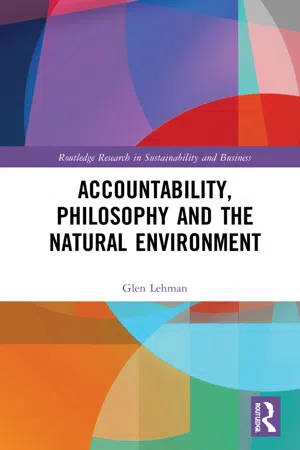Defining interpretivism
The complexity of accountability and ecological issues as they relate to business is well illustrated with recent pandemics and environmental catastrophes. The art of interpretation is used in this book to expose how bureaucratic and procedural logic ignores workers’ rights and environmental values, and potentially damages the corporation’s longevity. These issues are addressed critically through transformative action in the form of an evaluative framework embracing languages that reveal meaning and truth, enabling accountability to offer a different and moral sense-making. With the failure of socialist economics, it is useful to introduce ideas from MacIntyre (1984) and Taylor (2017a, 2020) as they apply to current environmental problems. Critical social theory and political interpretivism can be used to reveal the environmental implications of existing political dualisms that are dominant in Western philosophy. Drawing on Alisdair MacIntyre’s (1981, 1984) famous After Virtue which suggested that we have lost our moral compass and Charles Taylor’s (2016) work on The Language Animal.
Interpretation, as opposed to procedure, suggests that organisations are not simply profit mechanisms, but active and dynamic civil societies.1 By better understanding the facilitating processes of accountability, administrative and management thinking, it is possible that we can develop alternative strategies that empower individuals to circumvent the negative consequences of instrumental rationality and enable them to act more responsibly in the public interest (Taylor, 2017a).
The interpretative and phenomenological locus classicus is Taylor’s work on Hegel (1970), Heidegger (1971), Merleau-Ponty (1964, 2013), and Rousseau (1762). His work provides a multifaceted understanding of the specificity of communal life, and the common purposes that exist for everyone as included within the natural environment. Using the interpretive approach of Taylor (2007), the chapter explores connections between environmental theory and liberal and neoliberal political theory. A framework is developed to outline the key contributions to critical accounting from these philosophical perspectives. These elements contain the components of my matrix which includes an ‘epistemological dimension’ and an ‘ontological dimension’. The ‘epistemological’ dimension classifies research on accounting ethics according to whether the underlying assumption of the research is that the ethical decision is made by an individual acting alone or whether the decision is made by a group. The ‘ontological’ dimension classifies accounting and accountability research according to whether the underlying assumption of the research is that the goal of the ethical decision is the welfare of society as a whole or whether the goal is the welfare of the individual.
This book explores four principal approaches to accountability: overviewing procedural, critical, subversive, and interpretivist research. Despite the increased emphasis on critical accounting and accountability research in recent years, there seems to be a lack of focus in this area of research. I offer a matrix (Table 1.1) that has two dimensions to explore the philosophical input to critical accounting. The first dimension of the matrix deals with what is referred to as epistemology which involves the subject in the ethical act. The second aspect relates to the ontology of the philosophical approach. This chapter attempts to bring a greater degree of focus into research on accounting ethics by looking at the relative degree of emphasis placed by different critical approaches to research on accounting on these two dimensions of my matrix.
Table 1.1 Prominent theorists used in accountability research
| Epistemology | Ontology |
| Procedural (Kantian to liberalism) | Critical (Radical Critique of Marx) |
| Subversive (Postmodern and radical feminism) | Interpretivist (Qualitative and moral distinctions) |
Of course, there are various types of interpretive theory which offer different ways to understand meanings in human communities. They can be expressions of various reasons, intentions, beliefs, or signs. Interpretation is used to explain meanings as expressed in language and how it develops appreciation of humanity’s place in the world (Bevir & Rhodes, 2000). In short, interpretive approaches study beliefs, ideas, or discourses in the context of human communities. Importantly, interpretation is used to study beliefs as they unfold within, and invariably frame, actions, practices, and institutions. Interpretive theory applies to all of political studies. Behind the different types of interpretive theory, there lies the shared assumption that we cannot understand human affairs properly unless we grasp the relevant meanings.
The aim of this approach is to use interpretation as a meta-narrative in analysing, combining, and exploring the various meanings that shape human actions and political institutions. Traditionally, interpretation has been about how epistemology poses the question of ‘how do we know what we know about environmental and political science’. Traditional interpretive theories constitute one set of answers to questions about how I know things in the world. The interpretivism used in this book goes further in challenging the over-reliance on an epistemological approach to knowledge. The approach offered here uses Dreyfus and Taylor (2015) interpretivist phenomenology to explore humanity’s basic interactions in the world. This takes interpretation in an ‘anti-epistemological’ direction concerned with how humans are part of the natural environment.
